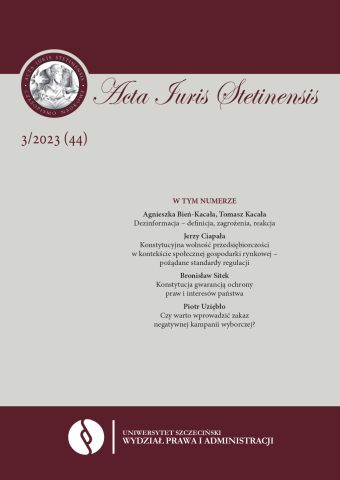






| Authors: |
Piotr
Uziębło

Akademia Nauk Stosowanych w Elblągu |
| Keywords: | negative campaigning election campaign freedom of speech political efficiency |
| Data publikacji całości: | 2023 |
| Page range: | 14 (109-122) |
| Downloads ?: | 81 |
| 1. | Curini L., Negative campaigning in no-cabinet alternation systems: Ideological closeness and blames of corruption in Italy and Japan using party manifesto data, „Japanese Journal of Political Science” 2011, vol. 12, nr 3. |
| 2. | Devlin P.L., Campaign commercials, w: A.A. Berger (red.), Television in society, Abingdon 2017. |
| 3. | Haselmayer M., Negative campaigning and its consequences: a review and a look ahead, „French Politics” 2019, vol. 17, nr 3. |
| 4. | Heawood J., Pseudo-public political speech: Democratic implications of the Cambridge Analytica scandal, “Information Polity” 2018, vol. 23, nr 4. |
| 5. | Jamieson K.H., Waldman P., Sherr S., Eliminate the negative? Categories of analysis for political advertisements, w: J.A. Thurber, C.J. Nelson, D.A. Dulio (red.), Crowded Airwaves, Washington 2000. |
| 6. | Kardaś J., Polityczne public relations podczas kampanii wyborczych w III RP, „Refleksje” 2015, nr 12. |
| 7. | King J.D., Mcconnell J.B., The effect of negative campaign advertising on vote choice: The mediating influence of gender, „Social Science Quarterly” 2003, vol. 84, nr 4. |
| 8. | Kolasiński M.K., Zasady ochrony dóbr osobistych w prawie wyborczym po weryfikacji w kampaniach 2005 i 2006 roku – uwagi de lege lata i de lege ferenda, w: A. Sokala, Z. Witkowski (red.), Przemiany prawa wyborczego – doświadczenia nowych demokracji. Republika Czeska, Republika Słowacka, Republika Ukraińska, Rzeczpospolita Polska, Bydgoszcz 2007. |
| 9. | Lau R.R., Rovner I.B., Negative campaigning, „Annual Review of Political Science” 2009, vol. 12. |
| 10. | Łukowiak D., Między wolnością słowa a zasadą równości biernego prawa wyborczego. Ramy prawne systemu finansowania kampanii wyborczych w świetle I poprawki do Konstytucji USA, „Studia Iuridica” 2018, nr 72. |
| 11. | Mayer W.G., In defense of negative campaigning, „Political Science Quarterly” 1996, vol. 111, nr 3. |
| 12. | Miklaszewska J., Wolność słowa a zjawisko propagandy, „Civitas. Studia z Filozofii Polityki” 2016, nr 18. |
| 13. | Newmark M.R., The Murchison Letter Incident, „The Quarterly: Historical Society of Southern California” 1945, vol. 27, nr 1. |
| 14. | Noremberg D., Kampania negatywna, czy nieistniejący „czarny” PR, jako metody dyskredytowania przeciwnika politycznego, „Środkowoeuropejskie Studia Polityczne” 2012, nr 2. |
| 15. | Nyblade B., Reed S.R., Who cheats? Who loots? Political competition and corruption in Japan, 1947–1993, „American Journal of Political Science” 2008, vol. 52, nr 4. |
| 16. | Papathanassopoulos S., Election Campaigning in the Television Age: The Case of Contemporary Greece, „Political Communication” 2000, vol. 17, nr 1. |
| 17. | Rakowska-Trela A., Kampania wyborcza w regulacji prawnej i w praktyce, Łódź 2015. |
| 18. | Romański M., Postprawda a manipulacja medialna: media w służbie polityki, „Media, Kultura, Komunikacja Społeczna” 2018, nr 3(14). |
| 19. | Sobczak J., Czy wolność słowa i wolność prasy są rzeczywiście potrzebne społeczeństwu i państwu?, „Ruch Prawniczy, Ekonomiczny i Socjologiczny” 2018, nr 1. |
| 20. | Surlin S.H., Gordon T.F., How Values Affect Attitudes toward Direct Reference Political Advertising, „Journalism Quarterly” 1977, vol. 54, nr 1. |
| 21. | Tak J., Political advertising in Japan, South Korea, and Taiwan, w: L.L. Kaid, C. Hoiltz-Bach (red.), The Sage handbook of political advertising, Thousand Oaks 2006. |
| 22. | Turska-Kawa A., Determinanty chwiejności wyborczej, Katowice 2015. |
| 23. | Uziębło P., Kampania wyborcza: reguły fair play czy raczej wszystkie chwyty dozwolone, w: J. Szymanek (red.), Niedemokratyczne wymiary demokratycznych wyborów, Warszawa 2016. |
| 24. | Walter A.S., Negative Campaigning in Western Europe: Similar or Different?, „Political Studies” 2014, vol. 62, nr 1. |
| 25. | Wojciechowski Ł., Procedura wyborów do Sejmu Rzeczypospolitej Polskiej – doświadczenia z kampanii wyborczej 2011, Lublin 2016. |
| 26. | Żmigrodzki M., Wojciechowski Ł., Polityczna reklama negatywna w Polsce, „Zeszyty Naukowe Wyższej Szkoły Ekonomii i Innowacji. Seria: Administracja” 2011, nr 1. |